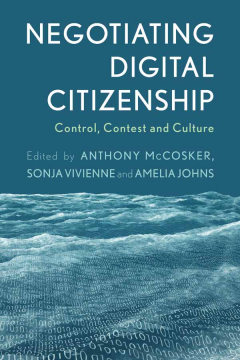
Additional Information
Book Details
Abstract
With pervasive use of mobile devices and social media, there is a constant tension between the promise of new forms of social engagement and the threat of misuse and misappropriation, or the risk of harm and harassment.
Negotiating Digital Citizenship explores the diversity of experiences that define digital citizenship. These range from democratic movements that advocate social change via social media platforms to the realities of online abuse, racial or sexual intolerance, harassment and stalking. Young people, educators, social service providers and government authorities have become increasingly enlisted in a new push to define and perform ‘good’ digital citizenship, yet there is little consensus on what this term really means and sparse analysis of the vested interests that drive its definition.
The chapters probe the idea of digital citizenship, map its use among policy makers, educators, and activists, and identify avenues for putting the concept to use in improving the digital environments and digitally enabled tenets of contemporary social life. The components of digital citizenship are dissected through questions of control over our online environments, the varieties of contest and activism and possibilities of digital culture and creativity.
The authors in this volume offer thought-provoking notions of digital citizenship across cultures and diverse contexts, across an impressive range of topics. While digital citizenship can be defined as the ability to participate in society online, these contributions examine critically, in important ways, what constitutes participation, how that varies for different populations, and the costs as well as the benefits of belonging in the digital age.
Karen Mossberger, Professor and Director, School of Public Affairs, Arizona State University, USA
This collection of essays offers an excellent representation of recent scholarship on digital citizenship. The contributions together challenge the reader to rethink the meaning of “digital citizenship”, doing so through interrogations of online practices ranging from more conventional political activisms to cultural politics emerging from intimate communities of affinity. It has given me much pause for thought.
Lincoln Dahlberg, Honorary Research Fellow at the Centre for Critical and Cultural Studies, the University of Queensland
Anthony McCosker is Senior Lecturer in Media and Communications, Swinburne University of Technology, Australia
Sonja Vivienne is Lecturer in Digital Media at Flinders University of South Australia
Amelia Johns is Research Fellow at the Alfred Deakin Institute for Citizenship and Globalization, Deakin
University
This engaging and lively volume not only provides brilliant guidance on the maze of technologies that are controlling, contesting, and creating digital citizens but also contributes to a broader understanding of performative citizenship by illustrating the ways in which people are making themselves as political agents of a world that is at once digital (virtual) and analogue (actual).
Engin Isin, Professor of International Politics, Queen Mary University of London (QMUL) and University of London Institute in Paris (ULIP)
